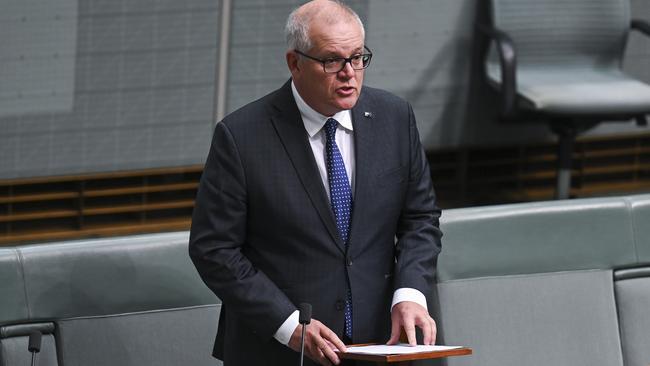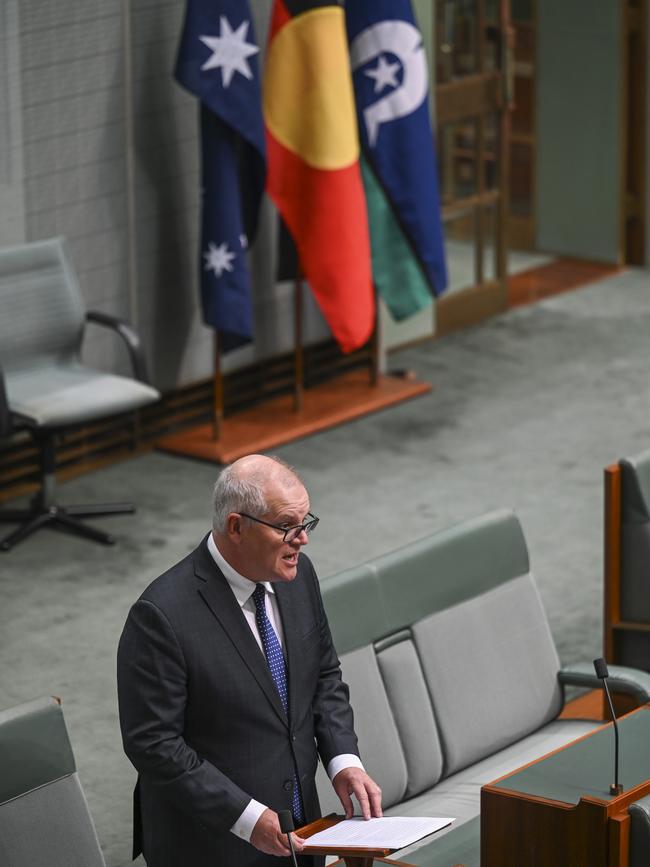Scott Morrison rejects ‘ill-defined, risky’ Indigenous voice to parliament with ‘no limits’
Former prime minister Scott Morrison has delivered a comprehensive rejection of the government’s Indigenous voice to parliament model, telling constituents why he’ll be voting No.

Scott Morrison has denounced the Albanese government’s proposal for an Indigenous voice to parliament, warning it will have unconstrained and untested constitutional powers that will permanently create different rights for Australians based on race.
In his first public comments outlining his position in detail, the former Liberal prime minister delivered a complete rejection of the government’s voice model, saying it created significant constitutional risk, had been poorly constructed, and was ill-defined.
Mr Morrison also claimed the permanent change to the Constitution – which would establish a voice that can make representations to the parliament and executive government – would “sadly not change the desperate circumstances being experienced in so many Indigenous communities”.
“I understand that is the hope of this proposal, and hope is a good thing, but hope disappointed will be crushing to the soul, and such disappointment can be reasonably foreseen by proceeding with the government’s proposal,” Mr Morrison told the House of Representatives.
“Once established, the voice cannot be removed by the parliament, as proved necessary when the Aboriginal and Torres Islander Commission became dysfunctional and was rightly and successfully abolished.
“As a constitutional body, the voice will also have constitutional powers that have not been tested before, and can never be constrained. This is a big deal. It constitutes a major change to our Constitution, with far-reaching implications, many of which are not yet known, and importantly will not be known at the time Australians are asked to vote.”
His comments marked a rare intervention in the political debate since he lost the prime ministership in May last year.
Mr Morrison said there had been many successful remedial initiatives in the past that had sought to recognise Indigenous Australians and address the injustices and inequalities they face – such as the 1967 referendum, Mabo decision, creation of the Native Title Act, and national apology – but insisted the voice was “fundamentally different”.
Agreeing with Peter Dutton, who earlier this week said the voice model would permanently divide Australians by race, Mr Morrison said the proposed changes would permanently create “different rights for one group of Australians over others, based solely on race”.
“The impact of the voice on the operations of executive government and the parliament are also not known, presenting significant and unknown risks that cannot be easily remedied, if at all,” he said.
“It is ill-defined, creating significant constitutional risk. Ultimately, the High Court will be left to decipher the unknown and decide what this will all mean, long after Australians have cast their vote, with no further say. This will inevitably lead to confusion and uncertainty over everything from our national defence to the operations of Centrelink, which will all fall within the ambit of the voice. There are no limits.”
Labor MP Marion Scrymgour, who spoke after Mr Morrison in the second reading debate on the government’s Constitution Alteration Bill, accused the Morrison government of putting the voice in the “too-hard basket” and savaged any suggestion Indigenous Australians wanted to be heard through the voice to parliament because of their race.
Ms Scrymgour, whose mother was a Tiwi Islander and father was a member of the Stolen Generations, said the government’s proposed constitutional amendment was “modest” and would ensure Indigenous Australians could “properly speak for our country and our issues”.
“The starting point for everything is respect. People aren’t asking to be heard because they’re from any particular race; the racial characteristics of Aboriginal and Torres Strait Islander people is a complete red herring,” she said.
“In the Northern Territory, particular groups of Aboriginal people are asking to be heard because since time immemorial they’ve had obligations to a particular part of this continent. And their culture and traditions are bound up with living at that place.
“It is disgraceful that people use that as a means to create doubt and division in the hearts and minds of people. I get that there are Australians who have already made up their minds and will vote No. No other Australian has the same obligation and responsibilities. If something’s going to happen that will affect Tiwi Islands and the people living there, they want to be able to speak about it to government. Not just as Australians but as Tiwi. No matter where you go, on whichever group’s country, the sentiment will be the same.”
Ms Scrymgour said the voice was a “convenient word for saying ‘let the right people talk’,” and the proposal for the new section to be inserted into the Constitution was “simple but powerful”.
“People do not feel that they’ve been listened to for who they are, and the current political system does not have the bandwidth to properly register the nuance and context of that grievance. This referendum is a major step towards fixing that,” she said.
Mr Morrison lashed the Albanese government’s “failure of process” and the lack of constitutional convention to ensure unintentional consequences could be remedied before Australians vote.

“The government also refuses to consider any changes to their proposal that would minimise these risks. This not only reflects a failure of process, but imposes the government’s model on the Australian people, rather than listening, responding and uniting,” Mr Morrison said.




To join the conversation, please log in. Don't have an account? Register
Join the conversation, you are commenting as Logout